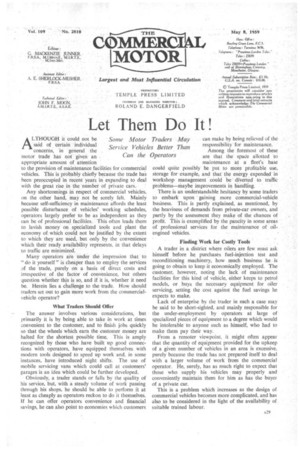Let Them Do It!
Page 31

If you've noticed an error in this article please click here to report it so we can fix it.
ALTHOUGH it could not be said of 'certain individual concerns, in general the motor trade has not given• an appropriate amount of attention to the provision of maintenance facilities for commercial vehicles. This is probably chiefly because the trade has • been preoccupied in recent years in expanding to deal with the great rise in the number Of private cars.. • Any shortcomings in respect of commercial vehicles, on the other hand, may not be sorely felt. Mainly because self-sufficiency in maintenance affords the least possible disturbance of vehicles' working schedules, operators largely prefer to be as independent as they can be of professional facilities. This often leads them to lavish money On sPeCialized tools and plant the economy of: which could not be justified by the extent to which they are used, but only by the convenience which their ready availability represents, in that delays to traffic are minimized.
Many operators are Under the impression that to "do it yourself " is cheaper than to employ the services of the trade, . purely on a basis of direct costs and irrespective, of the factor of convenience, but others question whether this is so, and if it is, whether it need be. Herein lies a challenge to the trade. How, should traders set out to gain more work from the commercialvehicle operator?
What Traders Should Offer The answer involves various considerations, but primarily it is by being able to take in work at times convenient to the customer, and to finish jobs quickly so that the wheels which earn the customer money are halted for the shortest possible time. This is amply recognized by those who have built up good connections with operators, have equipped themselves with modern tools designed to speed up work and, in some instances, have introduced night shifts. The use of mobile servicing vans which could • call at customers' garages is an idea which could be further developed.
Obviously, a trader stands or falls by the quality of his service, but, with a steady volume of work passing through his shops, he should be able to perform it at least as cheaply as operators reckon to do it themselves. if he can offer operators convenience and financial savings, he can also point to economies which customers can make by being relieved of the responsibility for maintenance.
Among the foremost of these are that• the spaCe allotted to maintenance at a fleet's base could quite possibly be put to more profitable use storage for' example, and that the energy. expended in workshop management could be' diverted' to mac problems—maybe improvements in handling. • There is an understandable hesitiney by some traders Lo embark upon "gaining more commercial-vehicle business. This is partly explained, as mentioned, by the heaviness of demands from private-car owners, and partly by the assessment they make of the chances of profit. This is exemplified by the paucity in some areas of professional services for the maintenance of oilengined vehicles.
Finding Work for Costly Tools A trader in a district where oilers are few must ask himself before he purchases fuel-injection test and reconditioning machinery, how much business he is going to obtain to keep it economically employed. The customer, however, noting the lack of maintenance facilities for this kind of vehicle, either keeps to petrol models, or buys the necessary equipment for oiler servicing, setting the cost against the fuel savings he expects to make.
Lack of enterprise by the trader in such a case may be said to be short-sighted, and mainly responsible for the under-employment by operators at large of specialized pieces of equipment to a degree which would be intolerable to anyone such as himself, who had to make them pay their way.
From a remoter viewpoint, it might often appear that the quantity of equipment provided for the upkeep of a given number of vehicles in an area is excessive, purely because the trade has not prepared itself to deal with a larger volume of work from the commercial operator. He, surely, has as much right to expect that those who supply his vehicles may properly and conveniently maintain them for him as has the buyer of a private car.
This is a problem which increases as the design of commercial vehicles becomes more complicated, and has also to be considered in the light of the availability of suitable trained labour.




































































































